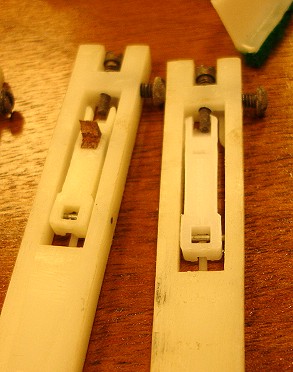Technical Library
ACTION VII: Delrin conversion
Entire Contents Copyright © 2021 CBHTechnical LibraryACTION VII: Delrin conversion Entire Contents Copyright © 2021 CBH |
 |
| Two Goble harpsichord jacks: The one on the left retains its original leather plectrum, while the one on the right has had the original tongue replaced ready for a Delrin wedge to be inserted and voiced. |
Delrin conversion…
The original leather plectra of many twentieth century revival harpsichords made in the 1950s and 60s are well past their use-by date. As a consequence, most of these instruments now have unreliable touch and tone, with weak, broken or missing plectra making them frustrating to play. Few makers or technicians consider it good practice today to try to replace the original leathers on these instruments with fresh, but they can be somewhat resurrected by converting their tired old leather plectra to Delrin or Celcon, followed by careful revoicing and regulating.
We have movies showing the Delrin conversion process for the action of harpsichords by three prominent English makers of this period: Goble, Morley, and de Blaise. Each movie has accompanying explanatory text:
We regularly undertake Delrin conversions either in the field or our Sydney workshop. The work is tedious and time-consuming. It should be noted that while the touch and reliability will be much improved, the subject harpsichord remains a thirty- or forty-year old instrument with the typical heavy case construction of the period and corresponding lack of tone. (This is reflected in the resale value of these instruments—much reduced from their true replacement cost or in comparison with instruments of decent quality based on historical principles of construction.)
| Technical Library overview | |
| Harpsichords Australia Home Page |